

20 phrases à dire aux enfants pour qu'ils écoutent. « On donne de la force aux enfants quand on reconnait leurs émotions. » disait Haim Ginott.

Cela implique de tendre l’oreille, de guider leur expression et de les accueillir en toute bienveillance. Voici 20 phrases à dire à vos enfants pour qu’ils écoutent. 1) « Ne fais pas ça ! » deviendra « J’aimerais que tu fasses ceci ainsi. » ou encore « tu me rendrais un grand service si tu…« . 2) « Arrête de crier, de râler, de pleurer !
3) « Je suis occupé. » deviendra « J’ai entendu ton message et je serai heureux de jouer avec toi dès que j’aurai terminé cette tâche importante. Le jeu de la communication émotionnelle avec les enfants. Jeanne Siaud-Facchin nous invite à jouer au jeu de cartes de la communication émotionnelle avec les enfants et les adolescents.
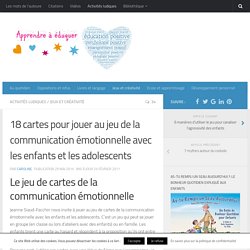
C’est un jeu qui peut se jouer en groupe (en classe ou lors d’ateliers avec des enfants) ou en famille. Les enfants tirent une carte au hasard et répondent à la proposition qu’ils ont entre les mains. Pour ma part, j’utilise ces cartes avec une élève de 5ème que j’accompagne : je termine chaque séance par une des questions sur les cartes. 22 alternatives à la punition (The Natural Child Project) On peut ne pas adhérer à toutes les propositions, voici quelques clés plutôt simples à mettre en place.

Je fais actuellement un challenge, 21 jours sans crier sur mes enfants, car 21 jours, c’est le temps qu’il faut pour perdre une habitude (je vous en reparlerai, je suis à J19 à l’heure où je vous écris, mais il m’a fallut deux bons mois…) Ces propositions peuvent aider à moins crier, à moins punir, et simplement à gagner en sérénité ; à vous de voir ! 1. Prévenir les comportements non désirés en répondant aux besoins de l’enfant aussitôt qu’ils se manifestent. Si ces besoins sont satisfaits, il sera libre de se concentrer sur le prochain apprentissage. Je me permettrai de souligner le mot besoin, nous ne parlons pas de désir, d’envie, mais de besoin, qu’il soit physique ou émotionnel.
LA DEMANDE - EN "AVENT" VERS LE BONHEUR FAMILIAL #5. Selon Marshall Rosenberg, pionner de la Communication Non Violente (CNV), le langage se base sur quatre étapes :- L'observation- L'expression de ses sentiments- L'expression des besoins- Et la demande Comme une chaîne, chaque maillon relié permet de s'exprimer sereinement, sans agressivité, de manière claire et constructive.
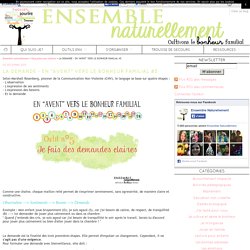
Observation ---> Sentiments ---> Besoin ---> Demande Exemple : Mon enfant joue bruyamment (O), je suis agacé (S), car j'ai besoin de calme, de respect, de tranquillité (B) ---> lui demander de jouer plus calmement ou dans sa chambre " Quand j’entends des cris, je suis agacé car j'ai besoin de tranquillité le soir après le travail. J'APAISE - EN "AVENT" VERS LE BONHEUR FAMILIAL #12.
Les émotions positives sont un moteur, cependant les émotions "négatives" peuvent prendre le dessus et perturber l'enfant.
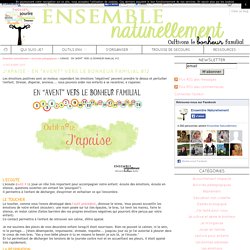
Stressé, dispersé, anxieux... nous pouvons aider nos enfants à se recentrer, à s'apaiser. L'ECOUTEL'écoute (outil # 6) joue un rôle très important pour accompagner notre enfant: écoute des émotions, écoute en silence, questions ouvertes (en evitant les "pourquoi? ")Il permettra à l'enfant de décharger, d'exprimer et verbaliser ce qui l'encombre. Passer de parent parfait à parent apprenant. Passer de parent parfait à parent apprenant – Voir nos erreurs comme des opportunités de grandir Nous naissons parent en même temps que notre premier enfant. – Mitsiko Miller Par Mitsiko Miller, cpc.
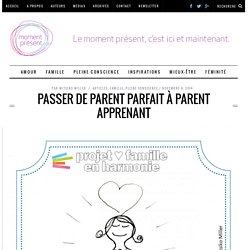
Seven Steps To Being Less Hard On Our Kids. After reading Rachel Stafford's moving post, "The Bully Too Close To Home," I thought a lot about the choices available moment to moment that make such a difference in our lives and the lives of our children.
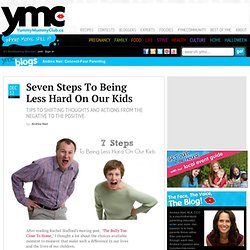
Stafford realized she wanted to stop being hard on her children and decided to put that wish into action. How To Do Parent-Child Relationship Repair. We all have parenting moments we regret.
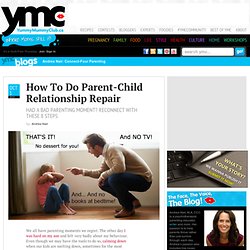
The other day I was hard on my son and felt very badly about my behaviour. Even though we may have the tools to do so, calming down when our kids are melting down, sometimes for the most ridiculous reasons, can feel impossible to do. It is important to do relationship repair after rough parenting moments. This helps our relationship with our children deepen, stops trust-rifts from growing, and also shows them how to have empathy—a concept that can’t really be taught. 16 Real ways to stop yelling at your kids. I felt my face turning hot.

I tried to take a deep breath. But there was already dragon fire, burning a hole in my chest. It was 8:27am. Eight Ways To Reduce The Stress Of Parenting A Toddler. Did you know that the most violent beings on earth are two-year-old children?
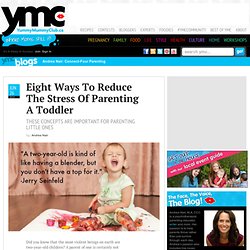
A parent of one is certainly not shocked to hear this! While gathering information for articles about toddlers, I have discovered desperate posts like this on the Internet, “Two-year-old for sale. Cheap!” In order to parent children under three, adults need to accept the challenging parts that come during this time (along with the super-cute parts). Toddlers will yell (a lot), throw, kick, break things, climb things, fling food into the air, keep you awake or get you up VERY early. Positive Discipline: SILENT SIGNALS.
Try a silent (secret) signal. (Kids love the secret part—especially when they have helped create it.) Creating silent signals can be part of “taking time for training” (another great tool card). My daughter, Mary Nelsen Tamborski, took time for training with four-year-old Greyson about interrupting. 'Gentle parenting' explainer: no rewards, no punishments, no misbehaving kids. In a piece in The Conversation, Bernadette Saunders described positive discipline. Parents who practise positive discipline or gentle parenting use neither rewards nor punishments to encourage their children to behave. By “no rewards” I mean they don’t use charts or “bribes” such as lollies or toys. Many don’t even say “good girl/boy” or “good job”.
And by “no punishments” I mean they don’t use time-outs, smacking, shaming or yelling. 8 Unrealistic Expectations Parents Have for Their Kids Having children can be incredibly rewarding or a pain in the you-know-what, depending on the situation. I know there are those who say that parenting is always wonderful. I think we all know they're lying. Our children mess up.
Steps To Help Calm Yourself Down When Emotions Rise Up. I believe that being able to calm ourselves in the throes of emotional intensity is one of the most valuable parenting skills to develop. The wild behaviour that can happen when our rage hijacks us can seriously damage the relationship with our children, grow negative core beliefs in their minds, and inadvertently teach our kids to react in the same manner when they, too, get taken over by big feelings. If you haven’t heard of the term negative core beliefs before, stay tuned, because I’ll be writing about that in the future. To create a calm-down plan that actually works, some understanding of the dynamics in play is necessary, as it is a combination of our self-talk, negative core beliefs, exhaustion level, and pure brain reactions that create that intense rushing sensation to shout or hit that can be very hard to stop. Here are the elements of a successful calm-down plan: Identify and challenge your negative self-talk.
Thriving While Parenting a Toddler While gathering information for articles about toddlers, I have discovered desperate posts like this on the Internet: "Two-year-old for sale. Cheap! " Raising little ones can be very hard! In order to parent children under 3, adults need to accept the challenging parts that come during this time (along with the super-cute parts). Toddlers will yell, throw, bite, kick, break things, climb things, fling food into the air, keep you awake or get you up VERY early. Teaching Peace to an Unpeaceful Child. Before we get into the full swing of this school year, I’ve been feeling like I need to work on some skill in our house that aren’t exactly school related, but should help us no end in getting learning done during the day. In fact, I recently put this question out to you all on the CWK Facebook page: Six Ways You’re (Unintentionally) Telling Kids NOT to Listen. Learning to be a good listener is a critical skill.
The F-ing Fours. My phone has been ringing with requests from frustrated parents of four-year-olds—“Help! My child keeps freaking out and nothing I’m doing is working.” How "Mixed Feelings" Influence A Child's Behaviour. It is easy to feel that our children are selfish or trying to hurt us when they are little. Young children can be quite aggressive! Helping Toddlers Resolve Conflicts (Rules of Engagement) Posted by janet on Sep 5th, 2013 Given a choice, I would avoid conflict like the plague, but I don’t live in a plastic bubble. My day is full of personal interactions with family, friends, co-workers and strangers (including the telemarketer predictably calling at dinnertime). 10 compliments qu'un enfant a besoin d'entendre.
Les enfants se tournent toujours vers leur maman pour chercher les encouragements. Les compliments leur donnent le coup de pouce dont ils ont besoin. 10 compliments qu’un enfant a besoin d’entendre. Facebook. 20 Parenting Tips Every Parent Needs to Know - Dirt and Boogers. Little Hearts/Gentle Parenting Resources. A Relationship Worth Protecting. “Can you see your love for me shining through? Cuz what you see in me, I can see in you. And soon enough, you and me we’ll be out of time. What if your child gets angry, but never breaks through to tears?
“Dr. La parentalité positive, c'est quoi exactement ? A force de lire et d’entendre des choses parfois vagues, parfois se réclamant d’un auteur ou d’un autre, parfois moralisatrices sur la parentalité positive, j’en suis venue à me demander ce que cette notion recouvre réellement pour MOI. Je trouve que cette vidéo d’Isabelle résume bien les grands principes que j’essaie d’appliquer au quotidien… je dis « j’essaie » car comme le dit si bien Isabelle Filliozat : « Il n’y a pas de parents parfaits » :-). 30 propositions pour encourager les enfants efficacement. Complimenter consiste à dire une formule d’appréciation positive sur un fait, une action accomplie, passée ou sur un état, sur la personne. Par exemple, affirmer qu’un dessin est joli,qu’un enfant est un bon garçon/ une bonne fille car il/ elle a fini son assiette,qu’un enfant est beau. On peut féliciter gratuitement, énoncer un compliment à la va-vite, à l’envolée, en jetant un coup d’œil rapide au dessin que l’enfant nous tend fièrement, parfois même sans le penser.
Le compliment n’engage pas la discussion, peut avoir un côté enfermant, l’enfant se voit coller une étiquette. Certains psychologues mettent même en garde contre les compliments contre-productifs. Best Life. Sibling Rivalry: Some Solutions. Steps To Help Calm Yourself Down When Emotions Rise Up. “Orange Rhino” Alternatives to Yelling. Motivational Thoughts for Moms - Dirt and Boogers. 14 CHOSES QUE LES PARENTS DEVRAIENT DIRE. 5 Questions to Ask Yourself Before You Yell At Your Children - Abundant Mama. 25 Ways to Reconnect with Your Kids - Dirt and Boogers. 9 Ways To Overcome Backtalk With Respect. 100 Ways to be Kind to Your Child. 25 Alternatives to "Good Job" picklebums.com. 10 Things Children Will Always Remember. Parents : Bienveillance Bien Ordonnée Commence par Soi-Même !